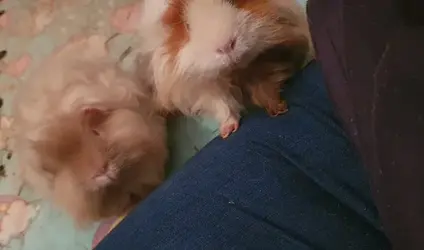Our boar Oscar started squealing last Friday while peeing so we got him in at the vets on the Saturday to get checked out, he's 3 years old. They felt no bladder stones so they gave him baytil and meloxicam for suspected cystitis. Fast forward to today, we just had another appointment and he's still peeing blood, and the vet noticed sediment in it so we're going to get him an ultrasound for stones. The one thing I'm unsure about is that they said because it hadn't cleared up, to stop giving him the antibiotic and only carry on with the painkiller. I assumed that antibiotics would have been continued, it's only been a week and I found that he wasn't getting soiled on his rear end anymore by the end of the week which I assumed meant good progress. Either way we'll get him the ultrasound and go from there, but how long are antibiotics usually used to rule out a UTI? His appetite hasn't been affected, and he's still very lively, I've cut out any calcium heavy veggies as a precaution. I will follow the vet's advice I'm just worried in case we miss anything, the answer they gave wasn't expected.
Hi
Symptoms for urinary tract problems are very similar but there are more issues in play than you my be familiar with:
- UTI (i.e. bacterial urine infection, caused by an overgrowth of faecal bacteria in the urinary tract); this is an opportunistic illness and needs exposure to cold/dampness/neglect and/or a lowering of the immune system. It is actually pretty rare in indoors piggies. There should be a response to antibiotics within a week; irrespective of wether it is baytril (enrofloxacin) or septrin/bactrim (trimethoprim/sulfamethoxazole).
- sterile cystitis (a non-bacterial bladder infection with regular flare-ups), better known under its old name, interstitial cystitis or IC. This the by far the most common infection in well kept indoors piggies and mainly affects piggies with a nervous disposition due to the current commercial mass breeding for shops and by for-sale backyard breeders. Because it is a new kid on the block, it is still not much known outside vet circles dealing with guinea pigs on a regular basis.
Because it is non-bacterial antibiotics can at the best only temporarily suppress symptoms but not cure them. At the stronger end antibiotics won't have any impact at all. Sterile cystitis can only be managed with analgesics and more importantly glucosamine but it cannot be cured.
Sterile IC is characterised by a far lower count (or rather more rarely a total absence) of bacteria in the urine thn expected. Most piggies do have some faecal bacteria in the urinary tract because the tiny scent gland is situated right in front of the genitalia. Mostly it is diagnosed by default after all other potential issues have been ruled out but symptoms persist or recur every few weeks.
- Bacterial bladder infection as a secondary of stones/sludge scratching the bladder walls. The bladder is in those cases generally hard and pulled together. There should be a noticeable response to antibiotics within a week. It is compartively rare as it takes long term damage or very scratchy stones/sludge.
- Stones and sludge can cause bleeding when they scratch the bladder walls or the walls of the ureters and urethra while passing from the kidneys into the bladder and then further on to the anus.
- 'Bloody pees': Please be aware that the red in the urine at the start of infections is very often caused by a natural dye called porphyrin. It is touch duller and darker red than fresh blood and dries more into dark maroon tones compared to mid-brown when you are dealing with real blood.
Seemingly clear or slightly cloudy urine can still test high for blood while red pees can test negative for it due to porphyrin.
With the antibiotic making no impact at all, your vet has eliminated a bacterial infection and is looking for other issues. Please be aware that due to overuse/resistancy problems increasing, vets have been strongly encouraged to restrict the use of antibiotics and to not use them on spec or continue of there is no reaction.
I hope that this makes sense?
